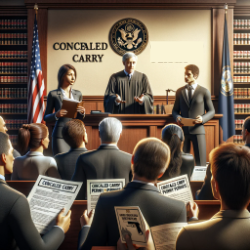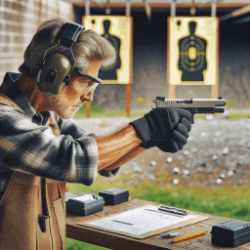
For outdoor enthusiasts who value the great outdoors, whether it's through hunting, hiking, or simply enjoying the tranquility of nature, knowing how to legally carry a concealed weapon is crucial. Having the freedom to explore with a sense of security is something many of us cherish and consider fundamental. Whether you're tracking deer at dawn, setting up camp in the backcountry, or protecting your homestead, a concealed carry weapon (CCW) can be an important tool for safety and peace of mind. States That Allow Ccw.
This guide aims to simplify the complexities surrounding concealed carry permits. It furnishes a state-by-state assessment, necessary for comprehending diverse and sometimes convoluted regulations. Especially for those in the hunting community or anyone engaged in outdoor activities where encounters with wildlife could pose a danger, being prepared and compliant with the law is vital. The regulations may vary greatly, mirroring the diversity of landscapes we encounter, with some states having more lenient permit processes, while others, like California, enforce stricter guidelines and requirements. states that allow ccw.

Furthermore, this guide is tailored for everyone from the novice gun owner looking into their first permit, to the experienced marksman needing to renew or understand reciprocity laws across state lines. For individuals involved in DIY projects on their property, to adventurers exploring the rugged terrains of America’s parks and forests, understanding how to navigate the legal landscape of concealed carry is equally important as mastering the physical one. States That Allow Ccw.
As we delve into this guide, keep in mind that staying informed and compliant with the law allows you to concentrate on enjoying your outdoor adventures with confidence and security. Whether you're a seasoned hunter affiliated with the NRA or someone who enjoys the occasional outdoor excursion, this guide provides the comprehensive overview you need. states that allow ccw.

A concealed carry permit grants individuals the legal right to carry a concealed firearm in public. Each state establishes its own regulations and standards for issuing these permits, often including background checks, training courses, and an application process. Failure to carry a concealed weapon with one of these permits, where required, can result in severe legal consequences. These permits are designed not only to ensure public safety but also to uphold the rights of responsible gun owners. As supporters of Second Amendment rights, we realize the significance of these permits in enabling law-abiding citizens to protect themselves and their families, particularly in uncertain times. It also demonstrates the trust placed in citizens who dedicate themselves to handling firearms with the utmost responsibility and respect for the laws that govern us. states that allow ccw.

States have diverse regulations for acquiring a concealed carry permit. For example, Kentucky might have less stringent regulations compared to California, which has rigorous requirements and processes. Understanding the specific laws of your state is essential for legally and responsibly carrying a concealed weapon. These variations often reflect the local culture and attitudes toward gun ownership and use. As a case in point:
This discrepancy necessitates that individuals seeking a CCW be well-versed not only in their state's laws but also in the regulations of any state they intend to visit. The process can range from simple to intricate, contingent upon your residency and experience with firearms, underscoring the importance for prospective applicants to conduct comprehensive research and readiness for potential requirements they may encounter. states that allow ccw.

Renewing your CCW permit can sometimes pose challenges similar to obtaining one initially. Most states require renewal every few years, often with a refresher course or shooting qualification. It's crucial to review your state’s official resources well before your permit expires to avoid any legal complications. This level of diligence is vital because lapses in permit validity can inadvertently lead to legal consequences, even for law-abiding citizens. Moreover, the renewal process typically updates you on any changes in gun laws, ensuring continued compliance with current regulations. Many states also use the renewal process as an opportunity to reassess the holder's eligibility, including any criminal activities or mental health concerns that might affect their suitability to carry a concealed weapon. This ongoing vetting process underscores the commitment to safety and responsible gun ownership. states that allow ccw.

Reciprocity occurs when one state acknowledges the concealed carry permits of another. A number of states acknowledge California’s CCW, but not all. Prior to undertaking your journey, ensure to check the CCW reciprocity agreements between your state of residence and your travel location to prevent any potential problems. It's essential for people who frequently travel state lines, whether it's for outdoor activities, competitions, or family visits. Below are some key considerations regarding CCW reciprocity.

This knowledge is crucial for maintaining compliance with different state laws and ensuring that your rights are protected while away from home. Understanding and navigating these complexities can help that that your travels are hassle-free. states that allow ccw.

Obtaining a CCW permit can be expensive and varies greatly depending on your location.These costs may involve the application fee, training classes, and occasionally extra fees for fingerprinting or background checks.Make sure to include these in your budget when considering applying for or renewing a CCW permit.Besides, certain states may require payment for the renewal process and any legal assistance necessary to navigate the application process.It's also important to factor in the expenses for the necessary firearms and accessories, like holsters or safe storage options, crucial for safely carrying and maintaining a firearm.It's also essential to budget for continuous training, as maintaining proficiency with your firearm is crucial for both safety and compliance. states that allow ccw.

The process of applying for a CCW permit can differ based on whether you're able to apply online or need to visit a local sheriff’s office.Typically, it involves submitting an application, completing required training, passing a background check, and paying any applicable fees.In numerous instances, applicants are also mandated to furnish fingerprints and undergo a personal interview to assess their reasons for seeking a CCW and their understanding of the responsibilities involved.This comprehensive method guarantees that only suitable individuals are given the privilege of carrying concealed firearms.For those who are new to the process, seeking guidance from legal experts or experienced permit holders can help efficiently navigate the complexities of state-specific requirements. states that allow ccw.

For those of us who take to the woods with a weapon, understanding the legal landscape is essential.This encompasses state laws as well as federal regulations that could impact where and how you carry your concealed weapon.Being a member of the NRA and a strong advocate of the Second Amendment, it’s vital to stay updated on:
Navigating these legal waters can be as challenging as exploring the physical terrain.Remaining informed about changes in laws and recent court decisions that may affect your rights and responsibilities is an important aspect of responsible gun ownership.In doing so, you not only ensure your safety but also the safety of those around you, preserving the integrity of the sport and the rights granted to you. states that allow ccw.

Laws around concealed carry are subject to change.Staying updated through resources like the National Rifle Association (NRA) can help ensure that you remain compliant with current laws and prepared for any changes that may come.As political landscapes change and public sentiments evolve, legislative changes can greatly influence the manner and locations in which concealed weapons can be carried.Listed below are some trends and potential future adjustments in concealed carry regulations that could impact gun owners:

By closely monitoring these developments, you can adapt to changes and still enjoy your entitlements under legal provisions. Participating in advocacy and engaging with firearms rights organizations can also play a pivotal role in shaping the future of concealed carry regulations. Such proactive involvement ensures that the opinions of responsible gun owners are considered in the legislative process, potentially influencing decisions that impact millions of Americans. states that allow ccw.

There are several resources accessible for help in obtaining a CCW permit. State government websites typically offer the most direct assistance, while various organizations focused on firearm safety and training also provide valuable guidance. Furthermore, many local gun shops and shooting ranges offer classes and can offer personalized advice based on their extensive experience with local regulations. Often, they have connections within the local licensing authorities and can offer insight into the intricacies of the application process in your area. states that allow ccw.
If you seek more structured assistance, the National Rifle Association (NRA) offers resources such as comprehensive state-by-state guides to gun laws, legal defense insurance, and updates on legislative changes affecting gun owners. Additionally, organizations like the United States Concealed Carry Association (USCCA) offer similar services along with educational programs and legal assistance specifically tailored for CCW permit holders. Using these resources can greatly simplify the process of obtaining and renewing your permit, ensuring you stay informed and compliant with current laws. states that allow ccw.

Navigating the complexities of concealed carry permits demands attention to detail and an understanding of ever-changing laws. By staying informed and compliant, you can ensure your safety and enjoy your outdoor activities without legal concerns. Whether you're an experienced hunter or a casual weekend hiker, understanding these laws is a vital part of being a responsible gun owner. states that allow ccw.
